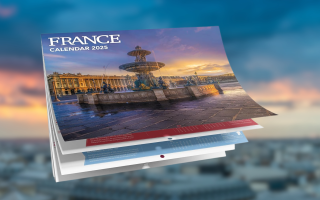Self-catering: Eat like a king without eating out in Strasbourg
On a gastronomic tour of Strasbourg, the capital of Alsace, Victoria Trott discovers a rich and varied food culture that is as inviting as the region itself
Eagerly tucking into a dish of choucroute aux trois poissons (sauerkraut with three fish), with Guy-Pierre Baumann, the chef who created it, I reflect how much things can change in a month.
Here in Guy-Pierre’s restaurant in Maison Kammerzell, one of the oldest and most beautiful buildings in the city, I remember how, when I first decided to go to Strasbourg, all I could think about was choucroute. I was sure I didn’t like Alsace’s best-known dish, even though I had never tasted it, and had no intention of eating it. Fermented cabbage and fatty pork? Not for me!
Guy-Pierre tells me: “Traditional choucroute is a heavy dish eaten in winter but I wanted something that we could serve all year round so I came up with the idea to make it with fish.” The recipe is one of 25 included in a free booklet, Alsace Wines & Country Recipes, available from the tourist office.
He continues: “Alsatian food is generally hearty with the likes of baeckeoffe (lamb stew topped with potatoes) and lots of charcuterie and pork products, as there is a tradition of pig rearing here. However, in spite of our land¬locked location, we get plenty of fish from the North Sea.”
Bowled over by the lightness of the dish, in both taste and mass, I decide to have a go at making it myself. On one side of the 15th-century four-storey Maison Kammerzell is the city’s vast, pink-hued Gothic cathedral, which has been on this site for 1,000 years, and on the other side is the Carré d’Or (Golden Square): four narrow, medieval streets offering some of the city’s best food shopping, especially Rue des Orfèvres.
Near the top at No.26 is Maison Georges Bruck (look for the golden goose), where foie gras has been made and sold since 1852. I know that many people aren’t keen on this French delicacy but it’s worth mentioning for its historical significance: pâté de foie gras was invented in Strasbourg around 1780.
Kilos of cabbage
A bit further along at No.16 is Frick¬Lutz, a butcher and traiteur (caterer), with every kind and cut of meat you can think of including knacks, the city’s famous pork, veal and beef smoked sausages. Surprisingly, it is in butcher’s shops that you buy the fermented cabbage (choux) to make choucroute, sold by the kilo.
The Alsatian capital seems to have an excellent pâtisserie and boulangerie on every street (in particular, check out Rue du 22 Novembre and Rue d’Austerlitz). Naegel, on the opposite side of Orfèvres at No. 9, is one of the best and has been producing cakey works of art and savouries since 1927. The house speciality is Tarte Naegel: a pie made with veal, pork and mushrooms marinated in white wine. You should also try kougelhopf,
a tall cake with raisins and almonds which is a ubiquitous regional speciality.
Alsace’s most celebrated cheese is AOC Munster: soft and strong-tasting, it’s made from cow’s milk in the Massif des Vosges. You’ll find it, along with around 250 other cheeses, in Maison Lorho at No.3. Madame Lorho, a Meilleur Ouvrier de France, tells me: “Other good regional cheeses are Welche, which is similar to Munster but the rind is washed with alcohol, and Tomme du Ried, which is made from the milk of cows who graze on herby marshland. Summer is the season for goat’s cheese.”
At No.1 is Pains Westermann, which supplies bread to some of the city’s top restaurants including Maison Kammerzell. Opened in 2012, the boulangerie sells 25 different loaves made on site using flour from a local mill. Around the corner at No. 2 Rue du Sanglier is fishmonger Poissonnerie du Centre. You can also buy fish at the market in nearby Place Broglie, one of several open¬air markets in the city, which takes place on Wednesday and Friday mornings. Stop off at Café Reck at 8 Rue de la Mésange for an espresso and to stock up on their freshly ground coffees.
There are a couple of wine shops on Rue des Orfèvres, but I’m heading somewhere more interesting: La Cave Historique des Hospices de Strasbourg.
A ten-minute walk south across the Unesco-classed Grande Île, the pretty city centre which sits in the middle of the River Ill, is a historic wine cellar dating from 1395. The Hospices owes its impressive collection to the wealthy individuals who over the centuries bequeathed parcels of vineyards. Sophie, the friendly sales assistant, tells me: “There are three AOCs in the region: Alsace, Alsace Grand Cru and Crémant d’Alsace. There are seven grape varieties, the most popular of which is riesling.
To accompany your choucroute, I’d recommend a Hospices Grand Cru Wiebelsberg or a Ruhlmann Riesling.”
Back in the daylight on Quai Saint-Nicolas, I can see the spires of the cathedral, which was the world’s tallest building from 1647 to 1874, and consider climbing the 332 steps to the viewing platform; or maybe taking a leisurely boat trip past the European Parliament. Instead, I stagger off to Pâtisserie Christian’s tea room at 10 Rue Mercière. All this walking and shopping is making me hungry.
LES BONNES ADRESSES
BAKER
Pains Westermann
1 Rue des Orfèvres
67000 Strasbourg
Tel: (Fr) 3 88 22 56 45
BUTCHER
Frick-Lutz
16 Rue des Orfèvres
67000 Strasbourg
Tel: (Fr) 3 88 32 60 60
CHEESE SHOP
Maison Lorho
3 Rue des Orfèvres
67000 Strasbourg
Tel: (Fr) 3 88 32 71 20
FISHMONGER
Poissonnerie du Centre
2 Rue du Sanglier
67000 Strasbourg
Tel: (Fr) 3 88 24 00 24
FOIE GRAS
Maison Georges Bruck
26 Rue des Orfèvres
67000 Strasbourg
Tel: (Fr) 3 88 32 00 04
PÂTISSERIE
Christian
10 Rue Mercière
67000 Strasbourg
Tel: (Fr) 3 88 22 12 70
Naegel
9 Rue des Orfèvres
67000 Strasbourg
Tel: (Fr) 3 88 32 82 86
WINE SHOP
La Cave Historique des Hospices de Strasbourg
1 Place de l’Hôpital
67000 Strasbourg
Tel: (Fr) 3 88 11 64 50
Share to: Facebook Twitter LinkedIn Email


